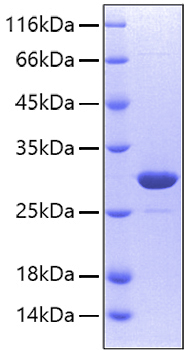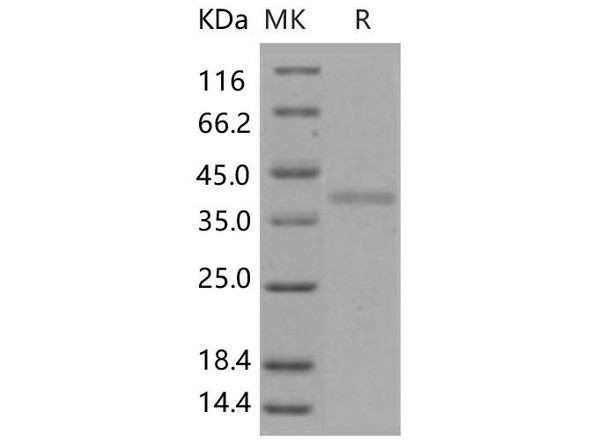Description
Recombinant Human Carbonic anhydrase 2 Protein
The Recombinant Human Carbonic anhydrase 2 Protein is a biologically active recombinant protein that plays a significant role in various cellular processes and signaling pathways in human biology. This protein is widely employed in immunological research, cell biology studies, protein-protein interaction analyses, and therapeutic development, providing researchers with a reliable tool for investigating Carbonic anhydrase 2 function and its implications in health and disease.
This product (SKU: RPCB0139) is produced using E. coli and features a No tag tag for convenient detection and purification. The protein exhibits a calculated molecular weight of 29.11 kDa with an observed molecular weight of 30 kDa under denaturing conditions, achieving ≥ 90 % as determined by SDS-PAGE.. Functional bioactivity has been validated through rigorous quality control assays, confirming its suitability for demanding research applications.
Key Features
| High Purity by Affinity Chromatography | |
| Mammalian & Bacterial Expression Systems | |
| High lot-to-lot consistency via strict QC |
| Product Name: | Recombinant Human Carbonic anhydrase 2 Protein |
| SKU: | RPCB0139 |
| Size: | 10 μg , 20 μg , 50 μg , 100 μg |
| Reactivity: | Human |
| Synonyms: | CA2, CA-II, CAC, CAII, Car2, HEL-76, HEL-S-282, carbonic anhydrase 2, CA-II, CAC, CAII, Car2, HEL-76, HEL-S-282 |
| Tag: | No tag |
| Expression Host: | E. coli |
| Calculated MW: | 29.11 kDa |
| Observed MW: | 30 kDa |
| Gene ID: | 760 |
| Protein Description: | High quality, high purity and low endotoxin recombinant Recombinant Human Carbonic anhydrase 2 Protein (RPCB0139), tested reactivity in E. coli and has been validated in SDS-PAGE.100% guaranteed. |
| Endotoxin: | < 0.1 EU/μg of the protein by LAL method. |
| Purity: | ≥ 90 % as determined by SDS-PAGE. |
| Formulation: | Lyophilized from a 0.22 μm filtered solution of 20mM Tris, 150mM NaCl, pH 8.0.Contact us for customized product form or formulation. |
| Bio-Activity: | Measured by its esterase activity. The specific activity is >840 pmoles/min/μg, as measured with 1 mM 4-Nitrophenyl acetate and 0.1 μg enzyme at 400 nm in 100 μL of 12.5 mM Tris, 75 mM NaCl, pH 7.5. |
| Reconstitution: | Centrifuge the vial before opening. Reconstitute to a concentration of 0.1-0.5 mg/mL in sterile distilled water. Avoid vortex or vigorously pipetting the protein. For long term storage, it is recommended to add a carrier protein or stablizer (e.g. 0.1% BSA, 5% HSA, 10% FBS or 5% Trehalose), and aliquot the reconstituted protein solution to minimize free-thaw cycles. |
| Storage: | Store at -20℃.Store the lyophilized protein at -20℃ to -80 ℃ up to 1 year from the date of receipt. After reconstitution, the protein solution is stable at -20℃ for 3 months, at 2-8℃ for up to 1 week. |
The carbonic anhydrases (or carbonate dehydratases) are classified as metalloenzyme for its zinc ion prosthetic group and form a family of enzymes that catalyze the rapid interconversion of carbon dioxide and water to bicarbonate and protons, a reversible reaction that takes part in maintaining acid-base balance in blood and other tissues. CA2 is a cytosolic enzyme with the highest activity among all known CAs. Mutations in the CA2 gene result in the CA II deficiency syndrome, an autosomal recessive disorder that produces osteopetrosis, renal tubular acidosis and cerebral calcification.







